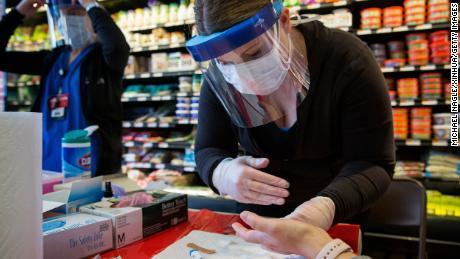Antibody tests, often called serological tests, look for evidence of an immune response to the infection. "Antibodies in some people can be detected within the first week of the onset of the disease," says the CDC.
"The results of serological tests should not be used to make decisions about the reunification of people residing or admitted to gathering places, such as schools, dormitories or correctional facilities," says the CDC.
"The results of serological tests should not be used to make decisions about the return of people to the workplace."
Health officials or health care providers who use antibody tests should use the most accurate test they can find and may need to test people twice, the CDC said in the new guidelines .
"In most countries, including areas that have been severely affected, the prevalence of anti-SARS-CoV-2 antibodies is expected to be low, ranging from less than 5% to 25%, so testing at this stage could result in more false positives and fewer false negatives, "said the CDC.
The higher the sensitivity, the less false negative a test will be. The higher the specificity, the fewer false positives. In all populations, testing gives more accurate results if the disease tested is common in the population. If an infection has affected only a small percentage of people tested, even a very small margin of error in a test will be magnified.
If only 5% of the population tested has the virus, a test with an accuracy of more than 90% can still miss half of the cases.
This is a point that has been raised frequently in recent weeks by public health experts, but the CDC is stating the problem in new advice on antibody testing.
False positive, false confidence
A false positive will lead someone to believe that he was infected when he was not. There is little evidence now that being infected gives people immunity to further infection, but doctors worry that people will behave as if they were immunized if they got a positive antibody test. .
"It cannot be assumed that individuals with really positive antibody test results are protected from future infection," says the CDC in the updated guidelines. "Serological tests should not be used to determine immune status in individuals until the presence, durability and duration of immunity are established."

The new CDC guidelines echo the advice of groups such as the University of Minnesota, which warns against using antibody tests to make policy decisions.
The CDC explains why the tests can be wrong so often. Much has to do with the frequency with which the virus is spread in the test population. "For example, in a population where the prevalence is 5%, a test with a sensitivity of 90% and a specificity of 95% will give a positive predictive value of 49%. In other words, less than half of the people tested positive will really have antibodies, "said the CDC.
"Alternatively, the same test in a population with an antibody prevalence greater than 52% will give a positive predictor greater than 95%, which means that less than one in 20 people tested positive will have a false positive test result."
Therefore, it's best to use high specificity tests - which are unlikely to generate a lot of false positives - and in populations where doctors suspect there are many cases, "said the CDC.
The Food and Drug Administration has also warned about the accuracy of antibody tests.
Source link